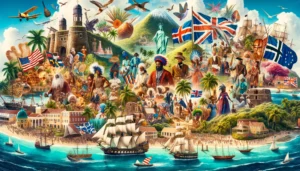History of the Virgin Islands
Virgin Islands
History of the Virgin Islands
Discovering the U.S. Virgin Islands: A Journey Through History
The U.S. Virgin Islands, an archipelago in the Caribbean Sea, are more than just a stunning destination for vacationers. Steeped in rich history, these islands have witnessed the saga of human civilization from the pre-Columbian indigenous tribes to European colonization and beyond. Let’s delve into the distinct historical narratives of St. Thomas, St. John, and St. Croix, and explore some of the most intriguing questions about these captivating islands.

St. Thomas: The Gateway to the Caribbean
St. Thomas has long been the bustling hub of the Virgin Islands. Discovered by Christopher Columbus in 1493, this island became a pivotal player in the Caribbean thanks to its strategic harbor at Charlotte Amalie. In the 17th century, it was claimed by the Danish and quickly became a thriving center for the sugar cane industry, driven by enslaved Africans. The island’s economy and society were profoundly shaped by these influences, culminating in its transfer to the United States in 1917. Today, St. Thomas is a vibrant mix of cultures with remnants of its Danish past visible in the architecture of Charlotte Amalie.
St. John: The Untamed Beauty
Unlike its siblings, St. John has remained largely undeveloped, preserving its rugged natural beauty. Occupied by indigenous peoples such as the Arawaks and Caribs, it was the last of the Virgin Islands to be colonized due to its challenging terrain. The Danish claimed it in the early 18th century, establishing sugarcane plantations worked by enslaved Africans. The most notable historical event here is the 1733 slave rebellion, one of the earliest and longest-lasting insurrections in the New World. Today, over half of the island is designated as a national park, protecting its diverse ecosystems and the ruins of colonial plantations.
St. Croix: The Cultural Melting Pot
St. Croix’s history is perhaps the most eclectic. Initially settled by the Spanish, the island saw a succession of European powers including the Dutch, English, French, and finally the Danish. Each colonizer left their mark on the island, contributing to its rich cultural tapestry. The island was a major sugar producer and experienced several slave revolts, the most famous being led by General Buddhoe in 1848, which resulted in the emancipation of the slaves in the Danish West Indies. St. Croix today prides itself on its diverse cultural heritage, evident in its music, festivals, and culinary traditions.
Questions & Answers About the U.S. Virgin Islands
Q: What were the main industries in the U.S. Virgin Islands during the colonial period?
A: The main industries were sugar cane, cotton, and rum production, driven by enslaved labor until emancipation. These industries shaped the economic landscape of the islands for centuries.
Q: How did the U.S. acquire the Virgin Islands?
A: The United States purchased the islands from Denmark in 1917 for $25 million in gold, largely as part of strategic measures during World War I.
Q: Are there any indigenous populations left on the islands?
A: Most of the indigenous populations, such as the Caribs and Arawaks, were decimated by disease, slavery, and conflict during European colonization. Today, their presence is mostly traced through archaeological sites and cultural studies.
Q: What is the significance of Virgin Islands National Park?
A: Virgin Islands National Park on St. John covers over half of the island and is crucial for preserving the natural and historical heritage of the region. It protects numerous species of flora and fauna, as well as archaeological remains of the pre-Columbian and colonial eras.
Conclusion:
The history of the U.S. Virgin Islands is a testament to the resilience and transformation of this unique Caribbean destination. From their turbulent beginnings to their present status as a beloved tourist locale, these islands offer a fascinating glimpse into the past and a vibrant culture to explore. Whether you are a history buff or a nature lover, the U.S. Virgin Islands promise a compelling adventure in every visit.